Civilization: a timeless, almost 30-year-old classic
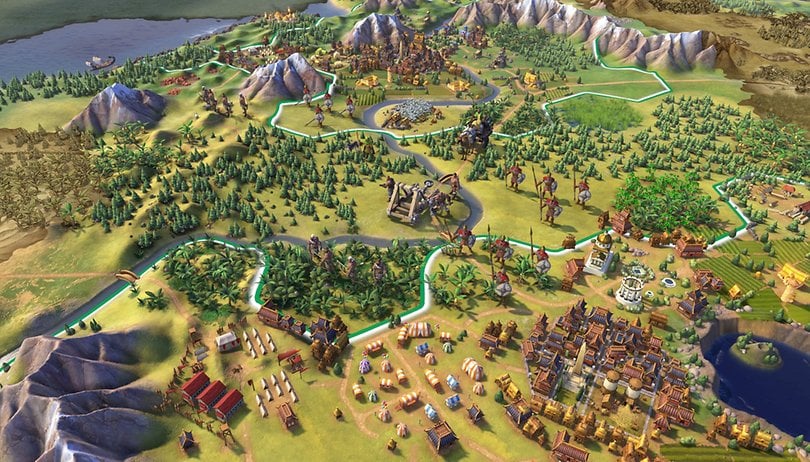

Read in other languages:
Originally designed by Sid Meier, Civilization is a strategy game that first appeared in 1991. The inaugural version was released for MS-DOS, and in almost 30 years and spanning across six main iterations, the Civilization series has established itself as one of the most acclaimed video games ever. You can even call it a sacred cow. Here is a quick walk down memory lane of one of the greatest ever strategy games released.
For those who are not familiar with Civilization, here is a quick description of the video game on its official page:
Civilization is a turn-based strategy game that challenges you to build an empire that can stand the test of time. Guide your civilization from the Stone Age to the Information Age to rule the planet. To build the most illustrious of all civilizations, you will go to war, conduct negotiations and advance your culture, while striving to stand up to the greatest leaders in history.
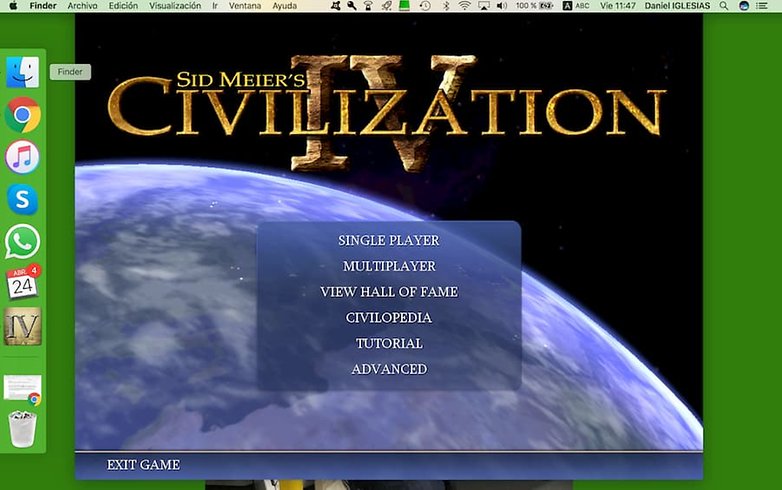
The end of an era...
The video game Civilization has almost always been looked forward to by PC or Mac gamers before it made its way to smartphone and tablet platforms. A quick reminder: It is 1991, which might be considered as "pre-history" by some. Video games were not the pervasive culture that we see today, and the Internet was in its infancy. PCs ran on Microsoft's DOS at that point in time, and it was only fitting for the first version of Civilization to be released in floppy disk format. The computer game was based on a board game of the same name that was designed by Francis Tresham and published in the United Kingdom in 1980. This strategy game was part of a family of management games such as SimCity (which came out in 1989) and caught the public's imagination.
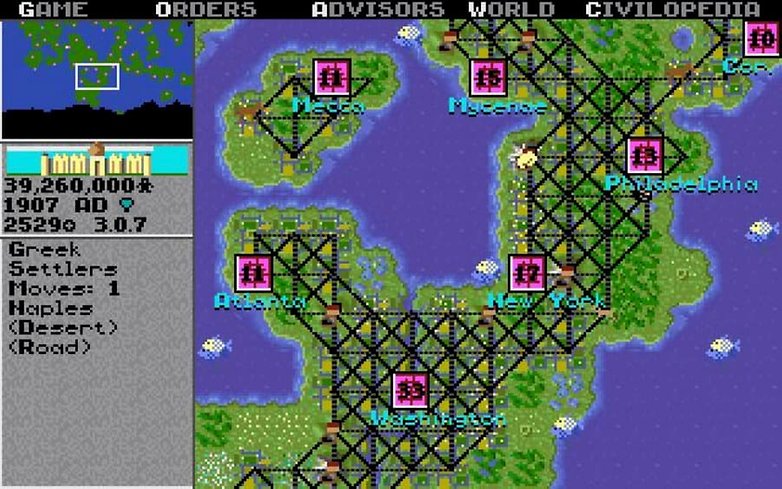 Civilization 1 and Civilization 2 looked like this. / ©
Spielbar.de
Civilization 1 and Civilization 2 looked like this. / ©
Spielbar.de
We were in an era where the Cold War was about to end, right after the Berlin Wall fell and at a time when the idea of the "End of History" by Francis Fukuyama celebrated the victory of political and economic liberalism over the communist model that was embodied by the defunct Soviet Union. In 1991, there was still talk of "great models of civilization" and the belief that history carried plenty of meaning. The first version echoed these beliefs, taking up the old concept of "civilization" in the 19th-century sense (already used by the 1980 board game of which the video game shared the same principle) that saw "civilization" as an ideal to be achieved, a process of societal transformation towards this ideal. The importance given to imperialist colonization is the active principle here.
The time of connectivity
The year 1995 remains one of the most important dates in the history of technology. Technological advances then happened in leaps and bounds across triumphant America under the presidency of Bill Clinton. Of particular note was the release of Windows 95, which was a real success and, a year after its release became the most popular operating system ever developed. It was during this time that work began on web integration prototypes such as Windows 98, resulting in it being the first operating system developed for use with the Internet.
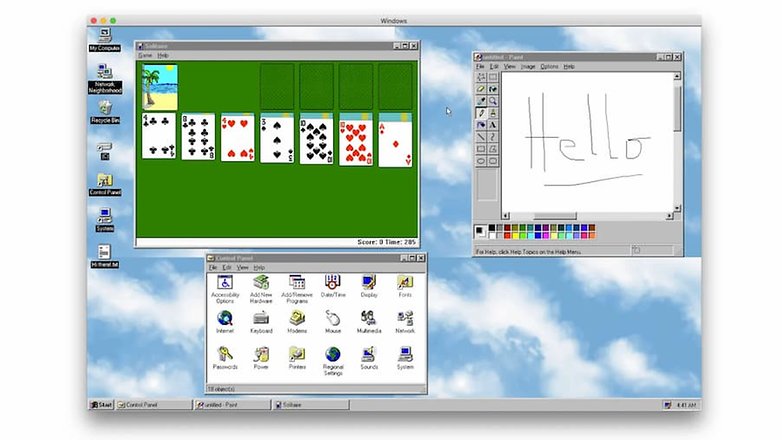
Sid Meier echoed this desire for connectivity and released a multiplayer version of Civilization in 1995 under the name CivNet (full game title: Sid Meier's CivNet). This redesign made it possible to play via a local area network (LAN), by modem, by computers connected through a cable or via the hot seat experience. While the game could be played on the Amiga (1992), Atari (1992) or Super Nintendo (1994) platforms in the past, this version was made exclusively for Windows 3.1 and Windows 95 operating systems. In addition, it marked the first time when both sound and graphics were able to create an engaging backdrop for a more realistic gaming experience.
Global success
The second version of the saga was released one year after the multiplayer version. Despite Sid Meier's departure from the franchise, Civilization II was a worldwide success at a time when the web allowed gaming communities to better organize themselves. Released in 1996 and translated into French in 1997, this game for Windows was later adapted for Playstation and Mac platforms. Updated at the turn of the millennium to be compatible with Windows XP, this version offered world customization for the first time, placing a huge emphasis on the development of cities and introducing major civilizations, some of which have continued as staples since: Romans, Babylonians, Germans, Egyptians, Americans, Greeks, and Indians.
This version consolidated the principle of victory by conquest (basically, the destruction of other civilizations), by technological victory (sending a spacecraft to the Alpha Centauri system) and by the degree of evolution of civilizations (urban planning, economy, satisfaction, construction of the Wonders of the World, citizen satisfaction, etc.). At the dawn of the 21st century, Civilization II hence rode on the idea of absolute growth (please note that this was well before the time of Pierre Rabhi or other prophets of regrowth), bearing witness to the optimism at the time regarding the future. As a reminder, this version included the notion of diplomacy and offered the possibility of creating embassies in friendly or rival civilizations.
The age of the Internet and globalization
Few video games embodied their era as much as Civilization III. Released in 2001, this version is the first to include most of the actors when it came to the diversity and triumphant globalization of the beginning of the new millennium. It revisited the old concept of "civilization" of the non-Western world, moving away from the usual labeling in terms of culture or degree of development (the benchmarks that justifies what is deemed as a "civilization"). From henceforth, for the game developers, the Iroquois, Persians, Zulus, or Aztecs are civilizations in the same way as the French, the English, or the Russians are. However, not all civilizations in the game start off on similar footing, as each of them has predetermined attributes that result in special bonuses.
The game here is part of an economic vision that favors the capture of strategic resources in order to spur development. For example, players need iron to build swordsmen or luxury products to improve the population's satisfaction rating. The game also emphasizes on the necessity and importance of trade routes. The game itself mirrored globalization that was happening at the time of its release: developing trade and communication networks (airports, roads, train lines for France). Civilization III can, therefore, be seen as a product of the dominant economic culture during that period. Here is an interesting little nugget: being the head of a democracy is no longer considered as an obstacle to war in this version.
Globalization and its challenges
Released in 2005 and 2010 respectively, Civilization IV and Civilization V were released in the post-9/11 world. The war in Iraq followed by the economic crisis of 2008 clearly left their marks on game developers. Basically, while the principles remained the same, these two versions point to a critical shift that reflected their respective eras.
Civilization IV always offered different options to win the game: a military victory, controlling two-thirds of the world's land area and population, or building a spaceship that can reach Alpha Centauri, or have enough Culture Points. However, there is also the great novelty of winning the game by being elected as the leader of the United Nations Organization (UN). For those who have forgotten, the United States went to war in Iraq on March 20, 2013 without having received the approval of the United Nations, provoking a series of diplomatic crises in the process (if you have time, listen to Villepin's speech, where civilizations and other themes were discussed). Did Civilization IV serve as a critique of the American expedition led by George W. Bush? You be the judge.
As for Civilization V, the game was released for Windows, Mac, and Linux platforms. For the very first time, developers relied on artificial intelligence to encourage multiple scenarios and make battles against the computer more attractive or even difficult (a request from long-time players, me included). Above all, this version marks a "social" turning point in the shadow of the 2008 financial crisis and socio-economic ravages that occurred. Now, players can win by putting in place systems of social policies. The player has the opportunity to "buy" social doctrines in exchange for culture points. These are used in the game to advance your civilization. Social policies then appear throughout history as freedom in antiquity or equality during the industrial revolution.
Space is no longer the final frontier
This is the most original and off-center part of the franchise. Released on October 24th, 2014 on Windows, and later on OS X and Linux by Aspyr, this game is set in the future with the possibility for humanity to travel in space and establish colonies on other planets. In this sci-fi version, it's not about conquering but colonizing. Here, you have the opportunity to play with different colonies such as Franco-Iberia, American Reclamation Corporation (ARC), or Brasilia.
In this version of the game, it embarks upon the anthropological theme of the conquest of space. It continues its initial project of space conquest as a symbol of the technological victory of a civilization. Present since Civilization II, this theme obviously echoes the programs by NASA (one thinks of the lunar expedition), and also the beginning of media coverage of flights and life in the International Space Station via the Internet.
The Present: Civilization VI
Released in 2016, Civilization VI is the first game in the saga that can be played on all platforms: PC, Mac, tablets, iPad, smartphones, Nintendo Switch, Playstation 4, and Xbox One. I leave it to you to discover which platform suits you best. I play it myself and I find that it has expertly blended all the nuances of the previous versions. There are once again, several ways to achieve victory: military victory, cultural victory, scientific victory, religious victory, and diplomatic victory. Unlike the other past opuses, one can also achieve victory by score alone which is dependent on a turn limit that has been defined by the player at the beginning of the game. This was incorporated after taking consideration from the fan community's requests.
You can download Civilization VI on the following platforms:
Conclusion
What makes a game a classic? Civilization is one of the few games that have gone through technological evolution and yet remained relevant. Many gamers have gone from playing on MS-DOS to the screen of their powerful iPhone 11 in almost three decades. This saga deserves some attention, as it reflects the times in which we live in and it also tells a little bit more about our recent history (I bet the COVID-19 pandemic will have its effect on future versions). Its strength is certainly due to the fact that passion for the game is passed on within families in the same way as for Mario Bros (1983) or FIFA. Perhaps that is what makes a game become a classic: shared memories and full of nostalgia.









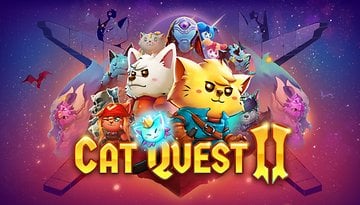










Civilization V is the best of all Civilization series. Civilization 1 is still my favorite game of all time. I played all Civilization series. Civilization VI was somewhat disappointed because of districts. Will the next game of Civilization VII come out to release?
I think cavillation 3 was the best before they updated and messed up the terrain
-
Admin
Apr 29, 2020 Link to commentA real classic. Suddenly, after more than 20 years, I would like to play it again